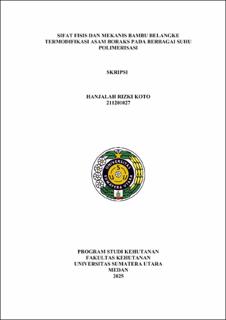Sifat Fisis dan Mekanis Bambu Belangke Termodifikasi Asam Boraks pada Berbagai Suhu Polimerisasi
Physical and Mechanical Properties of Borax Acid Modified Belangke Bamboo (Gigantoclhoa pruriens) at Various Polymerization Temperatures

Date
2025Author
Koto, Hanjalah Rizki
Advisor(s)
Hartono, Rudi
Sutiawan, Jajang
Metadata
Show full item recordAbstract
Belangke bamboo is one type of bamboo that can be used as a substitute for wood. However. bamboo has the disadvantage of being easily attacked by destructive organisms. so to increase its strength and durability. chemical modification is necessary. The chemical modification carried out is by impregnation using borax acid with a concentration of 5%. and polymerization at various temperatures. Namely 60°C. 80°C. 100°C. This study aims to determine the physical and mechanical properties of belangke bamboo (Gigantochloa pruriens) modified by borax acid impregnation at various temperatures and polymerization and to obtain the best polymerization temperature for borax acid impregnation. Bamboo raw materials of 2 cm x 2.5 cm. 6 cm x 2.5 cm. 10 cm x 2.5 cm and 30 cm x 2.5 cm were
impregnated with borax acid and vacuumed for 30 minutes and pressed for 30 minutes with 6 pressure. The bamboo was then baked at 60°C. 80°C. 100°C for 24 hours. Bamboo was then tested for physical properties. namely WPG, density,
moisture content, water absorption. and thickness development. Then tested for mechanical properties, namely MOE. MOR. and compressive strength. Then the results were analyzed with a Non-Factorial Completely Randomized Design (RAL). The results of the physical properties research showed the average value of WPG testing ranged from 16.98 - 28.39%. density ranged from 0.77 - 0.86%. moisture content ranged from 5.00 - 8.33%, water absorption ranged from 14.00 - 39.00%, thick development ranged from 2.31 - 12.58%. The mechanical properties test results showed the average value of the flexural strength (MOE) test ranged from
214,214 – 371,599 kg/cm2. fracture strength (MOR) ranged from 1,258 – 2,869 kg/cm2 and compressive strength ranged from 415 - 531 kg/cm². From the results of the analysis of the physical and mechanical properties, all have a significant
effect except for the density test. In this study, boric acid impregnation at the best polymerization temperature was 100°C because it had the best dominant results in
each test.
Collections
- Undergraduate Theses [2183]
